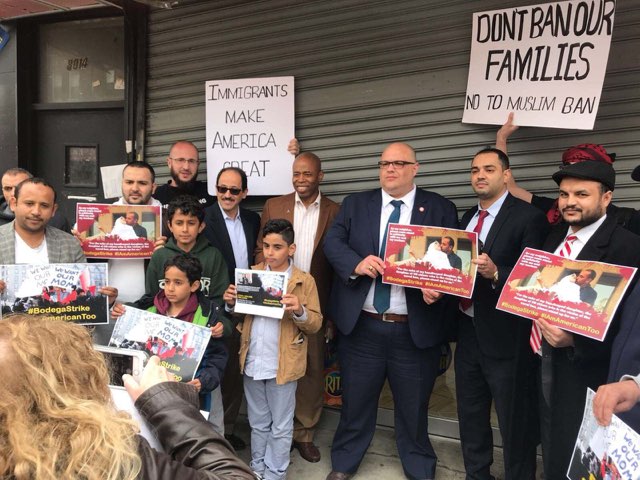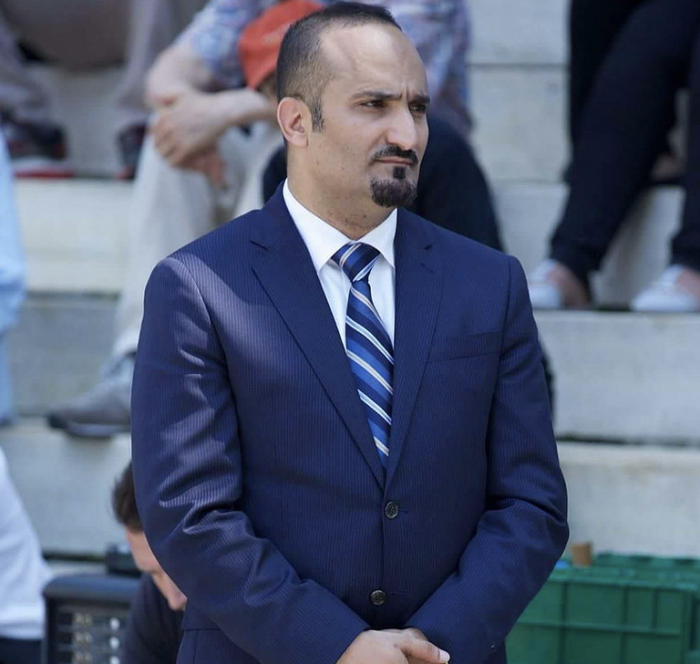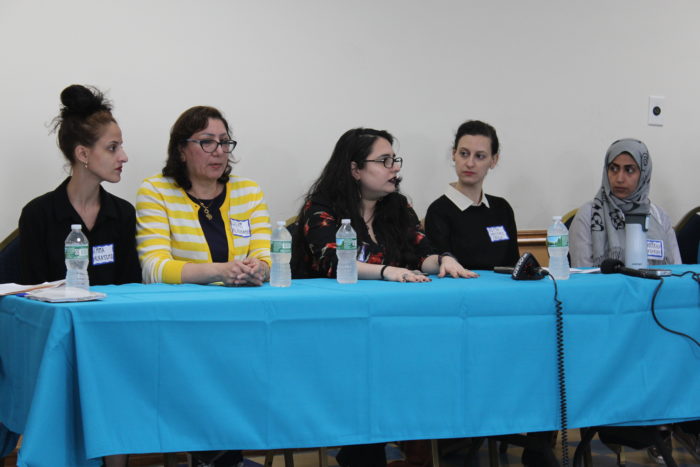How Bodega Owners Found Strength in Numbers
Responding to the travel ban, the Brooklyn-based Yemeni American Merchants Association rises up to protest and educate
Yemeni-American merchants staged a new strike this week to protest Trump's travel ban on primarily Muslim countries (Photo courtesy of Zaid Nagi)
When thousands of Yemeni-owned bodegas across New York City shut their doors for the day and rallied at Brooklyn’s Borough Hall on Feb. 2, 2017, it was a spontaneous event. The strike and rally were organized in just four days to protest President Trump’s travel ban on citizens from primarily Muslim countries.
But what started as a dramatic gesture has transformed into a more permanent organization to advocate on behalf of these business owners and their community: the Brooklyn-based Yemeni American Merchants Association (YAMA). The group staged another, one-hour strike this week on the eve of oral arguments before the U.S. Supreme Court in a case that will decide the legality of the third version of Trump’s executive order, which went into effect on Dec. 8, 2017.
The original strike last year was the idea of Zaid Nagi, an owner of a chain of wireless stores in the city, whose mother was stranded in Jordan by the travel ban. Nagi is now vice president of YAMA, which is pursuing a three-pronged strategy of outreach and education, community empowerment, and support services. There are about 4,000 Yemeni-owned stores in the city, 1,700 of them in Brooklyn.

Zaid Nagi, vice president of the Yemeni American Merchants Association (Photo courtesy of YAMA)
The travel ban has had a painful impact on these businesses, Nagi told The Bridge. “When you have your workers worried about their families across the globe, their function is not going to be 100%, which will result in less performance,” he said.
The travel ban affects the recruitment of new workers as well, he said. “The Yemeni-American community and the business community rely on the visa lottery. Most of the visa lottery winners are highly-educated individuals. When they win [visas], they usually come here and play a big role in expansion. Since 2017, that stream of talented workers has been cut off, so that’s affected businesses as well. Plus, [there are] the lawyer costs and the mental issues that arise as a result of people worrying about what’s next.”

At a discussion in Sunset Park this week, Muslim residents and civil-rights advocates talked about their experiences with discrimination and legal uncertainty (Photo by Arden Phillips)
In New York City as a whole, which has hundreds of thousands of Muslim residents, city officials have opened up the communication channels. The Mayor’s Office of Immigrant Affairs and the Arab American Association of New York (AAANY) hosted a roundtable this week at the Beit El-Maqdis Islamic Center in Sunset Park, bringing together community members and professionals providing aid to victims of discrimination.
“We want to make sure that people not only know how to report hate crimes and harassment, but also know how to receive safe and free immigration legal support,” said Bitta Mostofi, acting commissioner of the immigrant-affairs office. “It’s one of the reasons that we’re here, it’s one of the reasons that we stand together, aligned against not only the travel bans themselves but the rhetoric.”
Not only has there been an increase in bias crimes since Trump’s ban was enacted, but it has also disrupted families and caused a great deal of mental anxiety, several participants said. One woman, a Yemeni-American resident of Bay Ridge who identified herself as Elham, has a son who has been stuck for the past eight months in Djibouti, a country in the horn of Africa. He had obtained a visa to come to the U.S., but once the ban was enacted, his approval was revoked and her son was sent back to Djibouti. “He’s been very sick. It’s tearing the family apart. He’s the only [one] that’s stuck, everyone else is here,” his mother said through an interpreter.
Emma Alkasimi, who teaches English for the AAANY, said the travel ban has had an effect on her students. “It’s hard to know that you have four students drop out because they’ve heard that there’s a Muslim ban and there’s a chance that they might be deported. Trump, with his platform, confidently talks about how he hates Muslims. And that’s our President. So I have third graders who say ‘Hey you know, if the President hates Muslims, then my principal is going to hate me and my friends are going to hate me and Americans are going to hate me. And they stop going to school.”
Weam Ali, a fellow teacher at AAANY, said her sister-in-law, who wears a Muslim veil, endured at attack of hate speech in Brooklyn recently. Standing on 7th Avenue near Prospect Park waiting for the bus with her son on a rainy day, “a guy just drove too fast and the water went on her and her son. And he yelled at her, ‘Muslim, get out of here!” said Ali, adding, “The people that used to hide their hate, now they start bothering us, they show us their hate, it’s like not we’re human anymore.” The travel ban has seemed to embolden such hate, she said.
Other participants in the roundtable included Rama Issa-Ibrahim, executive director AAANY; Casey Smith, a paralegal on the litigation team at the International Refugee Assistance Project; Setareh Shodaei of the Iranian Community of the Northeast; and Jo Kaur, staff attorney for the NYC Commissioner on Human Rights.










